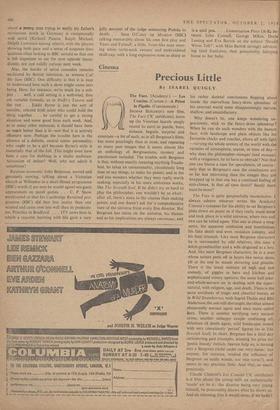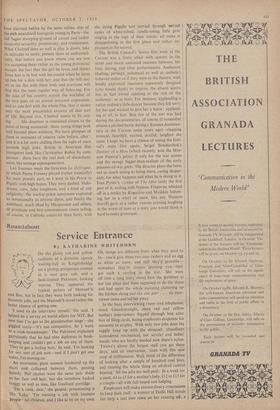Cinema
Precious Little
By ISABEL QUIGLY
INGMAR BERGMAN'S new film, The Face ('X' certificate), turns up (its Venetian laurels snugly round its ears) to puzzle, bore, exhaust, beguile, surprise and
entertain—a bit of each, as in all Bergman's films, but more puzzlingly than in most, and repeating so many past images that it seems almost like an anthology of Bergmanisms, mystery and puzzlement included. The trouble with Bergman is that, without exactly meaning anything fraudu- lent, he takes an unreasonably, circuitously long time to say things, to make his points; and in the end one wonders whether they were really worth making, especially in his more ambitious works, like The Seventh Seal. If he didn't try so hard to play the philosopher, one wouldn't be so irked : after all, there's more to the cinema than making points, and one doesn't ask for a comprehensive view of the universe from every film director. But Bergman has taken on the universe, his themes and so his implications are always enormous; and his rather skeletal conclusions flapping about inside the marvellous fancy-dress splendour of his external world seem disappointingly narrow, shallow, and unsatisfactory.
Why 'doesn't he, one keeps wondering un- graciously, stick to the fancy-dress splendour? When he can do such wonders with the human face, with landscape and plain objects like his favourite clocks and coaches, above all with light —varying the whole texture of the world with the varieties of atmosphere, season, or time of day— why does the philosopher-manqué (and manatee, with a vengeance, he is) have to obtrude? Not that one can 'blame a man for speculation, of course : only that in Bergman's case the conclusions are so far less interesting than the images they are wrapped up in that one has a continual feeling of anti-climax. Is that all (one feels)? Surely there must be more?
7'he Face is quite purposefully inconclusive. I always admire whoever writes the Academy Cinema's synopses for his ability to set Bergman's plots down on paper as if they really made sense and took place in a solid universe, where two and two can be relied upon. This one is about a mag- netist, his apparent confusion and humiliation, his fake death and even mistaken autopsy, and his final triumph. Like most Bergman characters he is surrounded by odd relatives, this time a witch-grandmother and a wife disguised as a boy.
And, like most Bergman characters, he is a man whose nature peels off in layers like onion skins, till at the end he stands shivering and pitiable.
There is the usual mixture of high and low comedy, of giggles in barn and kitchen and sophisticated misery upstairs; the same half-joke- and-whole-earnest air in dealing with the super- natural, with religion, age, and death. There is the same antithesis of tragic and cheerful beauty as in Wild Strawberries, with Ingrid Thulin and Bibi Andersson, the one still distraught, the other almost abnormally normal again and once more called Sara. There is another terrifying very ancient crone, another unhappy couple confessing all, delusions of death again, wild landscapes mixed with very consciously 'period' figures (as in The Seventh Seal). In short, Bergman has a field day caricaturing past triumphs, winning his prize for 'poetic beauty' (which, heaven help us, is turning into a Bergman cliché under our very noses: has anyone, for instance, studied the influence of Bergman on sunlit woods, not vice versa?), and seems to say precious little. And that, as usual, preciously.
Claude Chabrol's Les Cousins ('X' certificate) is a film about the young with an authentically 'inside' air to it : the director being very young himself, he presumably knows what he shows us. And an alarming film it would seem, if we hadn't
been alarmed before by the same milieu, that of the rich anarchical bourgeois young in Paris—the old Sagan stamping-ground of casual and rather mournful sexuality, promiscuity, and rootlessness. What Chabrol does so well is play it down, take its attitudes so easily, present them so undramati- cally, that before you know where you are you are accepting them rather as the young provincial accepts the fact that the girl he loves and thinks loves him is in bed with his cousin when he turns Up late for a date with her; and that she will stay on at the flat with them both and everyone will find this the most regular way of behaving. For the sake of his country cousin the worldlier of the two puts on an almost innocent expression; and so you feel with the whole film, that it shows only the most presmtable exterior of that sort of life. Beyond that, Chabrol seems to be say- ing . . . His direction is restrained almost to the Point of being mannered : these young things look well beyond plain wildness. We have glimpses of them in moments of relative calm before, after : and it is a lot more chilling than the sight of mere Juvenile high jinks. British or American film Youngsters look like Christopher Robin by com- parison : these have the real look of disenchant- ment, like teenage septuagenarians.
Leo Joannen made the ferocious Le Defroque, in which Pierre Fresnay played (rather ironically) his most priestly part, so I went to his Priest in Pigalle with high hopes. They were dashed. Melo- drama, corn, false toughness, and a kind of coy religiosity; the worker-priest movement exploited as sensationally as anyone dares, and finally the antithesis, much liked by Maupassant and others, of prostitute and first communicant (more telling, of course, in Catholic countries than here), with the dying Pigalle tart carried through serried ranks of white-robed, candle-toting little girls singing at the tops of their voices; all make it disappointing in the first place and rather un- pleasant in the second.
The British Council's Soviet film week at the Curzon was a lively affair with queues in the street and much animated reaction between, be- fore, during, and after performances. Audiences (feeling, perhaps, polemical as well as testhetic) behaved rather as if they were in the theatre, with loudly expressed reactions apparently designed (you would think) to impress the absent actors but in fact aimed sidelong at the rest of the audience: or at both. For instance, applauding a rather ordinary little dancer because they felt sorry for her and wanted to give her a boost : applaud- ing at all, in fact. Best fun of the sort was had during the documentaries, of course (I remember almost a pitched battle during a Russian documen- tary at the Curzon some years ago)—clapping ironical, heartfelt, excited, dutiful; laughter the same. I hope we have a chance of seeing the festi- val's main film again, Sergei Bondarchuk's Destiny of a Man (which recently won the Mos- cow Festival's prize), if only for the war scenes and the savage bigger-than-realism of the early prisoner-of-war parts. The director plays the hero, not so much acting as being there, caring desper- ately for what happens and what he is doing to it. Ivan Pyriev's %rsion of The Idiot (only the first part of it, ending with Natasia Filipovna whisked off in a troika by Rogozhin and Myshkin follow- ing her in a whirl of snow, like any Western sheriff) gave us a rather riotous evening laughing in the worst of taste at a story you would think it hard to make grotesque.







































 Previous page
Previous page